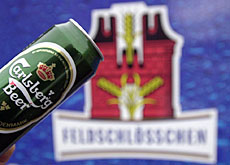New cartel law has firms watching their backs

Swiss companies have been diligent about ensuring they comply with a new law aimed at stamping out cartels, says the president of the competition commission.
The new rules came into force in April, but firms have a year to comply before they risk penalties for manipulating prices.
“Business has understood that the tougher cartel law is something that should be taken seriously,” said Walter Stoffel, the commission’s president.
He added that he was hoping the new rules would destabilise cartels, and so prevent companies from colluding to fix prices.
Around 30 firms have made use so far of the one-year transition period to check that they conform to the law. For the past six months, the commission’s work has focused almost exclusively on providing companies with this information, according to Stoffel.
The watchdog will not penalise any company during that period. But from April 1, 2005, any firm that contravenes the anti-cartel law faces fines of up to ten per cent of its revenue over the past three years.
New powers
The new legislation has reinforced the competition commission’s powers, putting it on an equal footing with its European and American anti-trust counterparts.
The system encourages whistle blowing among cartel members by promising leniency to members that denounce a cartel in which they have participated. The commission also has extended powers to raid firms for evidence of collusion.
At the same time, it has increased its workforce to 65 employees, although another five are still needed. This shortfall will hinder the commission’s work for a limited time, according to its director, Rolf Dähler.
“It takes about a year for new employees to be trained up,” he said. “If we need more people, we will put in a request.”
No immediate fines
Most of the commission’s employees are economists and legal experts. But given that much information – and therefore evidence – is stored electronically, more technically minded employees might be needed.
“We are considering whether to hire more computer specialists for our searches,” added Olivier Schaller, the commission’s vice-director.
It will be some time, however, before the watchdog decides to go ahead with any searches.
“Nobody should expect us to fine companies on April 1 next year,” said Stoffel. “This kind of surveillance takes at least two years to get up and running.”
Stoffel added that the commission’s aim was not to hand out heavy fines, since the law was written to discourage companies from joining or forming cartels.
swissinfo with agencies
The revised cartel legislation was introduced on April 1 this year.
Any company breaking this law could face a fine worth ten per cent of its revenue over the past three years.
Cartels and other obstacles to competition cost the Swiss economy between SFr2 billion and SFr3 billion annually.

In compliance with the JTI standards
More: SWI swissinfo.ch certified by the Journalism Trust Initiative



You can find an overview of ongoing debates with our journalists here . Please join us!
If you want to start a conversation about a topic raised in this article or want to report factual errors, email us at english@swissinfo.ch.